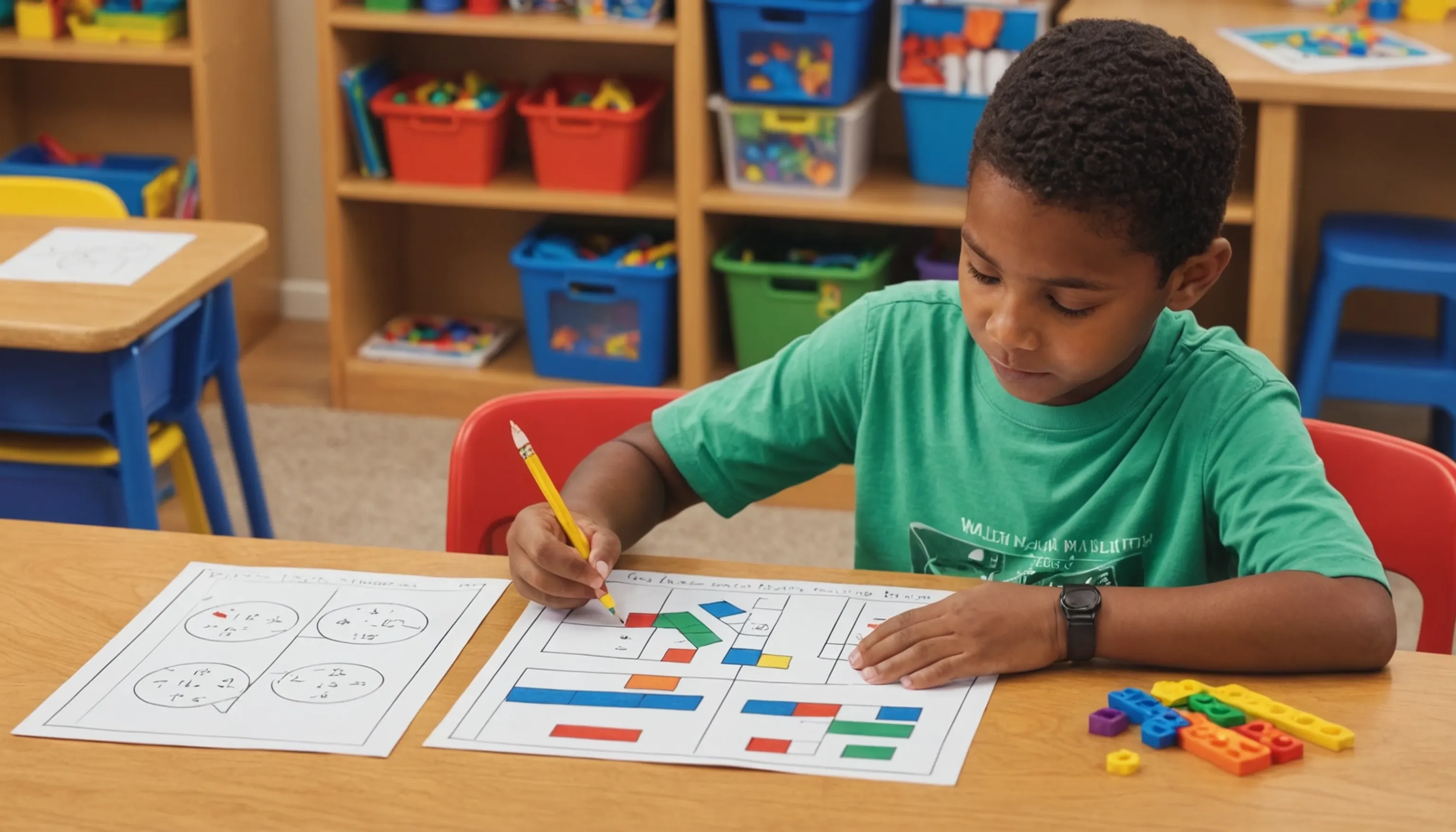How Thinking Like a Mathematician Helps Your Child in Life
 HvWHenry van Wagenberg
HvWHenry van Wagenberg
How Thinking Like a Mathematician Benefits Your Child
Thinking like a mathematician offers numerous benefits for your child, extending beyond the classroom. It nurtures critical skills such as analytical thinking and logical reasoning. When children learn to approach problems systematically, they become better equipped to tackle complex issues in life.
Moreover, mathematical thinking enhances their ability to make informed decisions and develop solutions creatively. As they engage in mathematical challenges, they learn to break down problems into manageable parts, fostering a sense of accomplishment. Ultimately, these skills not only aid academic success but also prepare them for real-world situations, making them more adaptable and confident.
Critical Thinking Skills Developed Through Mathematics
Mathematics is not just about numbers and formulas; it is a powerful tool for developing critical thinking skills in children. When students engage with math, they learn to analyze information, evaluate different approaches, and make reasoned decisions. This process of critical thinking is essential for navigating both academic and real-life challenges.
In math classes, students often encounter problems that require them to think deeply and creatively. They learn to:
- Identify patterns: Recognizing patterns helps children make connections between different concepts and apply them in various situations.
- Formulate hypotheses: When solving problems, students often make educated guesses before arriving at a solution, promoting a scientific approach to thinking.
- Assess their reasoning: They learn to check their work and understand the importance of verifying results, fostering a habit of self-reflection.
- Communicate their thought processes: Discussing mathematical ideas with peers helps develop their ability to articulate thoughts clearly and effectively.
These skills are transferable and beneficial in numerous aspects of life. For example, when faced with a decision-making situation, children who think critically can weigh the pros and cons, consider alternatives, and arrive at a logical conclusion. Furthermore, critical thinking fosters a sense of curiosity and encourages lifelong learning, making it a crucial aspect of personal and academic growth. Emphasizing the importance of critical thinking in mathematics can significantly enhance your child's overall cognitive development.
Problem-Solving Abilities and Their Importance
Problem-solving abilities are vital for your child's success, both in school and in everyday life. Mathematics serves as an excellent platform for honing these skills, as it requires students to tackle various challenges systematically. When children engage in mathematical problem-solving, they develop a structured approach to finding solutions, which can be applied to diverse situations.
One of the key aspects of problem-solving is the ability to analyze a problem. Children learn to break down complex problems into smaller, more manageable parts. This skill not only makes it easier to find solutions but also helps them understand the underlying principles of the problem. As they work through mathematical scenarios, they also learn to:
- Generate multiple solutions: Mathematics encourages creative thinking, allowing children to explore different ways to reach a solution.
- Test hypotheses: They learn to make educated guesses and test their ideas, which fosters a scientific mindset.
- Reflect on their approach: After solving a problem, students can evaluate their methods, learning what worked and what didn’t.
These skills are crucial beyond mathematics. In real-life situations, children often face problems requiring critical thinking and adaptability. Whether resolving conflicts, planning projects, or making decisions, strong problem-solving abilities enable them to navigate challenges effectively. By emphasizing problem-solving in their education, you equip your child with essential tools for lifelong success.

Applying Mathematical Thinking in Everyday Life
Applying mathematical thinking in everyday life is an essential skill that can greatly enhance your child's decision-making abilities. Mathematics is not confined to the classroom; it permeates various aspects of daily life, from budgeting to cooking, and even in making plans with friends. When children learn to apply mathematical thinking, they gain practical skills that can help them navigate real-world situations effectively.
For instance, when budgeting their allowance or planning a shopping trip, children use basic arithmetic to determine how much they can spend and how to allocate resources. This type of mathematical thinking fosters financial literacy, enabling them to make informed decisions about saving and spending.
Moreover, cooking involves measuring ingredients and adjusting recipes, which requires a solid understanding of fractions and proportions. Children who engage in cooking activities can see the direct application of math in achieving desired outcomes, reinforcing their learning.
Additionally, mathematical thinking can be applied in planning activities, such as organizing a birthday party. Children learn to estimate costs, manage time, and coordinate with friends, all of which involve mathematical reasoning.
Encouraging your child to recognize and apply mathematical concepts in everyday situations not only solidifies their understanding of math but also builds their confidence in using these skills. By integrating math into daily life, you prepare your child for future challenges, making them more adept at solving problems and thinking critically.
Building Confidence Through Mathematics
Building confidence through mathematics is crucial for your child's overall development. When students tackle math problems successfully, they experience a sense of accomplishment that boosts their self-esteem. This confidence spills over into other areas of their lives, encouraging them to take on new challenges.
As they progress in their math skills, children learn to embrace mistakes as opportunities for growth. This mindset fosters resilience, allowing them to persevere through difficult concepts. Ultimately, a solid foundation in mathematics equips your child with the confidence to face academic challenges and everyday situations with a positive attitude.
Encouraging a Growth Mindset
Encouraging a growth mindset in your child is essential for fostering resilience and a love for learning, especially in mathematics. A growth mindset is the belief that abilities and intelligence can be developed through dedication and hard work. This perspective is critical in math, where challenges and setbacks are common. By promoting a growth mindset, you help your child view difficulties as opportunities for growth rather than insurmountable obstacles.
One effective way to encourage this mindset is by praising effort rather than innate talent. For instance, instead of saying, "You're so smart," try saying, "I’m proud of how hard you worked on that problem." This shift in language reinforces the idea that perseverance leads to improvement.
Additionally, share stories of famous mathematicians or scientists who faced challenges and failures before achieving success. Highlighting these examples can inspire your child to embrace challenges and understand that setbacks are a natural part of the learning process.
Encourage your child to set personal goals in math and celebrate small achievements along the way. This practice reinforces the idea that progress is a journey and that every step forward is worth recognizing. By creating an environment where mistakes are seen as learning experiences, you cultivate resilience and a love for mathematics that will serve your child throughout their academic journey and beyond.

Overcoming Challenges with Mathematical Thinking
Overcoming challenges with mathematical thinking equips your child with essential skills for tackling obstacles in both academic and personal realms. Mathematics encourages a systematic approach to problem-solving that can be applied to various challenges. When faced with a difficult math problem, children learn to break it down into smaller, more manageable parts, a strategy that can be utilized in everyday situations.
For example, when a child encounters a complex task, whether it’s a challenging homework assignment or a group project, they can apply the same mathematical thinking techniques. They begin by identifying the key components of the problem, organizing the information, and generating potential solutions. This methodical approach fosters critical thinking and allows them to view the challenge from different angles.
Moreover, mathematical thinking teaches children the importance of patience and perseverance. They learn that it’s okay to make mistakes, as each misstep is an opportunity to learn and improve. This resilience is crucial when facing any setback, whether in academics, sports, or social situations.
Encouraging your child to approach challenges with a mathematical mindset helps them develop confidence in their abilities. As they master various mathematical concepts, they realize that they can apply the same skills to other areas of their lives. By reinforcing this connection, you empower your child to face challenges head-on, fostering a lifelong ability to problem-solve and adapt to new situations.
The Role of Perseverance in Math Learning
Perseverance plays a crucial role in math learning, shaping your child's ability to tackle difficult concepts and overcome obstacles. Mathematics often presents challenges that can be frustrating, but developing perseverance helps students push through these difficulties. When children encounter a tough math problem, it’s essential for them to stay engaged rather than giving up.
Encouraging a mindset that values effort can help children understand that mastery takes time. By celebrating small victories and recognizing their progress, they learn that persistence leads to improvement. This attitude not only enhances their math skills but also instills a sense of resilience applicable in various aspects of life.
Moreover, as they practice perseverance in math, children develop confidence in their problem-solving abilities, fostering a willingness to take on challenges in other subjects and activities. Ultimately, nurturing perseverance is vital for your child's academic and personal growth.
How Math Teaches Resilience
Mathematics is a powerful teacher of resilience, equipping children with the ability to bounce back from setbacks and persist in the face of challenges. When students engage with math, they often encounter problems that require multiple attempts to solve. This trial-and-error process is fundamental in helping them understand that failure is not the end but a stepping stone toward success.
For instance, when children struggle with a complex equation, they learn to analyze their mistakes, adjust their strategies, and try again. This iterative process fosters a mindset that values effort and perseverance. Each time they confront a challenging problem, they build their resilience by learning to cope with frustration and maintain motivation.
Additionally, math encourages students to set achievable goals and work toward them systematically. As they experience gradual improvement, they gain confidence in their abilities, reinforcing their resilience. This confidence is crucial not only for academic success but also for facing challenges in other areas of life.
Moreover, the structured nature of math teaches children how to break down larger problems into manageable parts. This skill is invaluable when they encounter obstacles in academics, sports, or personal relationships. By recognizing that resilience is built through effort and persistence, children learn to approach challenges with a positive attitude, ready to tackle whatever comes their way.
Life Lessons Learned from Math Challenges
Math challenges offer valuable life lessons that extend far beyond the classroom, teaching children essential skills and attitudes that are applicable in various aspects of life. One of the most significant lessons learned through math is the importance of perseverance. When faced with difficult problems, students learn that success often requires multiple attempts and a willingness to learn from mistakes. This understanding fosters a mindset that embraces challenges rather than shying away from them.
Additionally, math teaches problem-solving skills that are crucial in everyday situations. Children learn to analyze problems, break them down into smaller parts, and develop strategies for finding solutions. This structured approach to problem-solving can be applied to real-life scenarios, such as making decisions, resolving conflicts, or planning projects.
Furthermore, math challenges help children develop resilience. They learn that setbacks are a normal part of the learning process and that persistence is key to overcoming obstacles. This resilience builds confidence, enabling them to tackle challenges in academics and personal pursuits with a positive attitude.
Moreover, working through math problems encourages critical thinking and analytical skills. Children learn to assess situations logically, evaluate options, and make informed decisions, skills that are vital for success in any field. Ultimately, the life lessons learned from math challenges prepare children to navigate life's complexities with confidence and competence, equipping them with tools for lifelong success.
